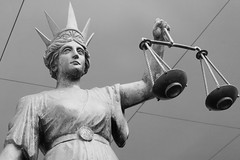When Record Labels Become The Enemy

The RIAA is at it again, ruining the lives of young college students who have an affinity for music. Universities across the country are being urged to target students who have been illegally downloading music over campus networks (“Music companies targeting colleges”). The main software programs monitored are AresWarez, BitTorrent, eDonke,y and other programs through Gnutella and FastTrack services. The top five schools with the most accused students are Ohio, Purdue, University of Nebraska-Lincoln, University of Tennessee, and the University of South Carolina.
Schools are advised to come up with their own disciplinary programs under federal law, or else the school risks being sued. The RIAA then can identify the accused student through numerical internet addresses and the information the school keeps about the identity of the student assigned that internet address. Michigan State meets with students caught twice and forces them to watch an eight minute anti-piracy DVD produced by the RIAA. If the student is caught a third time, the student is suspended for the semester. At the University of Massachusetts at Amherst, students risk having their internet unplugged, and receiving additional punishment from the dean. Purdue refuses to notify most students caught by the RIAA, because the task is too tedious. Purdue claims that it does not feel it is responsible for leading investigations on its students; students who are there at one of the top technology schools to learn. Purdue has the right idea. It does not seem like universities should take time to be involved in helping the RIAA. Schools are busy enough trying to teach and prepare their students for success in future careers. To go target their own students for an outside organization, seems contradictory. This also does not stop college students from going on networks outside of campus to download illegally.
Schools, however are not the only ones being monitored by the RIAA. On January 16, 2007, the record labels in a sense bit the hand that feeds them. Officers that work closely with the RIAA to stop music piracy burst into a recording studio. They confiscated recording equipment, cars, computers, and more than 25,000 music CDs. Two of the studio owners were arrested and several college interns were detained. The owners are actually two of the most famous DJs in the country, DJ Drama and DJ Don Cannon. The studio was accused of bootlegging, but in actuality it was part of an alternative distribution system for major record labels. The business did violate federal copyright law, because the CDs were unlabeled, lacking the name and address of the producers. The DJs however were not stealing, but actually promoting new hip-hop artists for major labels through mixtapes. The mixtapes are then sold to independent record stores who do not have a large enough customer following to order from major distributors. The mixtapes include songs “leaked” by record labels to DJs to test the songs’ popularity before their release. The mixtapes are likened in Shapiro’s New York Times article to an A&R department. Labels test new hip-hop artists on mixtapes to determine the artists’ chances of success. The pay to DJ Drama or DJ Don Cannon is done by labels in secret, without contracts, and ranges from $10,000 to $15,000. It is the same labels that hire these DJs that also hired the investigators at the RIAA to perform arrests. Shapiro mentions the schizophrenia of the record labels today, where the marketing side wants to promote artists in mixtapes, but the business side wants to sue the producers of mixtapes to get more royalties. It seems the record labels have not learned the lesson “You can’t have your cake and eat it too.” The good thing is that these DJs are only expected to gain more business due to the publicity and arrests. The press has created that tough image that hip-hop artists tend to strive for.
So does this mean the RIAA is stopping any time soon? It doesn’t look like it. Artechnica just did a report about how the RIAA is begging ISPs to cooperate with its efforts to sue illegal downloaders. So now the RIAA wants ISPs to help sue their own customers? What happened to the idea that the customer always comes first? Apparently the RIAA is hoping to bypass courts. It wants ISPs to send letters to it customers who are allegedly illegally downing. If the customer contacts the RIAA, the labels get the customer’s ID, and the customer receives a chance to avoid court if the customer pays a large enough fine. The letter sent to the customer includes a phrase that states if the customer fails to contact the RIAA and the RIAA sends a subpoena, the ISP will be legally obligated to provide the customer’s information. The worry here is that the RIAA admits that past US ISP data has led to information that wrongly accused customers of illegally downloading. So, some customers could be bullied by the RIAA when they are innocent. The customer would then have to go through the hassle of either paying the settlement or paying more money for a lawyer to go to court and prove that the customer has done nothing wrong, but that there was a mistake in the information taken from the ISP log files. To deal with such problems, the RIAA is starting a website: www.p2plawsuits.com which informs customers about opting for costly settlements rather than drawn out court hearings. So either way the RIAA makes money, off those who are rightly accused, and sometimes off those who are wrongly accused. What causes a mistake in ISP log files? Could any downloading of music be possibly accidentally recorded as illegal by an ISP log file?

0 Comments:
Post a Comment
Subscribe to Post Comments [Atom]
<< Home